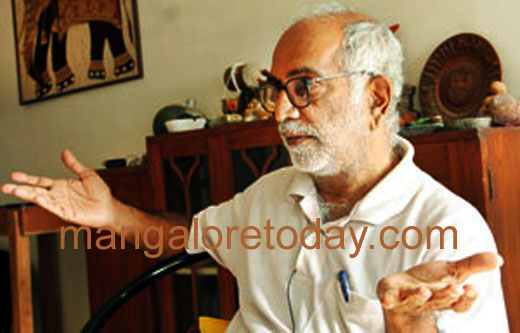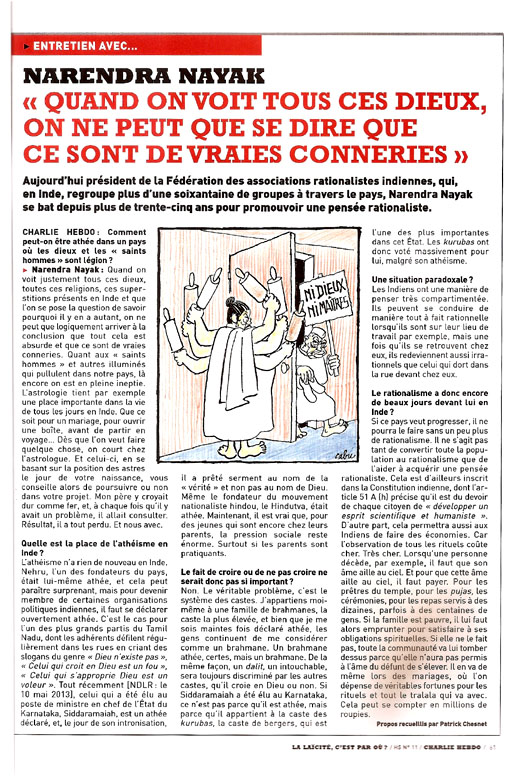“When you see all these gods, one can only say that these are real crap” - Narendra Nayak
“When you see all these gods, one can only say that these are real crap” - Narendra Nayak
mangaloretoday.com
Mangalore, Jan 11: Narendra Nayak remembers the Interview with CHARLIE HEBDO in 2013. Here is the translation in English.

Now president of the Federation of Indian Rationalist Associations, which, in India, has more than sixty groups across the country, Narendra Nayak has been fighting for more than thirty-five years to promote rational thought.
CHARLIE HEBDO: How can you be atheist in a country where the gods and the "holy men" are legion?
Narendra Nayak: When we see precisely these gods, all these religions, these superstitions present in India and that it raises the question of WHY there is much one can logically come to the conclusion that this is absurd and that are real crap. As for the "holy men" and other enlightened that abound in our country, yet it is full nonsense. Astrology is such an important place in the life of every day in India. Whether for a wedding, to open a box, before going on a trip ... As soon as you want to do something, it runs to the astrologer. And the latter, based on the position of the stars on the day of your birth, then advise you whether to continue with your project. My father believed in hard as iron, and each time there was a problem, he would see. As a result, he lost everything. And us.
What is the role of atheism in India?
The atheism is nothing new in India. Nehru, one of the founders of the country, was itself atheist, and this may seem surprising, but to become a member of some Indian political organizations, we must declare openly atheist. This is the case for one of the biggest parties Tamil Nadu, whose members regularly marched in the streets shouting slogans such as "God does not exist", "Whoever believes in God is a fool", "Whoever appropriates God is a thief”. Recently [Editor’s note: May 10, 2013], who was elected to the post of Chief Minister of Karnataka, Siddaramaiah, is a declared atheist, and on the day of his enthronement he sworn in the name of the "truth" and not in the name of God. Even the founder of the Hindu nationalist movement, Hindutva, was atheist. Now it is true that, for young people who are still with their parents, peer pressure is enormous. Especially if the parents are practicing.
To believe or not to believe is not so important?
No. The real problem is the caste system. I myself belong to a family of Brahmins, the highest, and although I am repeatedly declared atheist caste people still consider me as a Brahmin. A Brahmin atheist, certainly, but a Brahmin. Similarly, a Dalit, an untouchable, will always be discriminated from other castes, he believes in God or not. If Siddaramaiah was elected to Karnataka, it is not because he is an atheist, but because he belongs to the Kurubas caste, the caste of shepherds, which is one of the largest in the state. The Kurubas therefore voted overwhelmingly for him, despite his atheism.
A paradoxical situation?
The Indians have a very compartmentalized way of thinking. They can behave quite rational way when they are on their workplace for example, but once they find themselves at home, they also revert irrational than sleeping in the street in front of them.
Rationalism has yet bright future in India?
If this country wants to progress, he could do it without a bit of rationalism. It is not so much to convert the entire population of the rationalism that help acquire a rational thought. This is also enshrined in the Indian Constitution, Article 51 A (h) states that it is the duty of every citizen to "develop a scientific spirit and humanistic." On the other hand, it will also allow the Indians to make savings. For observing all the rituals is expensive. Very expensive. When a person died, for example, requires that the soul goes to heaven. And that soul goes to heaven, you have to pay. For the temple priests, for the pujas, for the ceremonies, for meals for dozens, sometimes hundreds of people. If the family is poor, then it must borrow to meet their spiritual obligations. If it does not, the whole community will get over it because it will not allow the soul of the deceased to rise. It’s the same at weddings, where spending real fortunes for rituals and all the hoopla that goes with it. This can be counted in millions of rupees.
Interview by Patrick Chesnet.
Disclaimer: Translated from original French version printed in Charlie Hebdo using Google Translate. Errors in translation may exist and are unintentional.

- "Promised her on the grave...": Neha Hiremath’s father apologises to Karnataka govt
- Congress vs Left after Kerala MLA demands Rahul Gandhi’s ’DNA test’
- Karnataka man hires goons to kill family, plan goes wrong
- LS Elections 2024 | With Rs 5785 cr assets, TDP LS contestant Chandra Sekhar stirs poll attention
- Arvind Kejriwal, K Kavitha To Stay In Jail, Custody Extended By 14 Days
- Supreme Court talks tough, asks Team Ramdev, ’Apology same size as ads?’
- ’Illegal to Hear Hanuman Chalisa’: PM Modi Takes on Karnataka Govt in Rajasthan
- Indian-origin married man kills girlfriend in Singapore, gets 20 years in jail
- Soon WhatsApp users will not require internet to send pictures, files
- 10 Killed after 2 military choppers collide mid-air in Malaysia, Watch
- Snakes on a plane: Man flies from Bangkok with 10 anacondas, arrested in Bengaluru
- Arvind Kejriwal administered insulin in tihar jail after sugar levels soar
- Vittal: 2 suffocate to death when installing ring to well
- Congress will win 24 seats in state, Manjunath Bhandary exudes confidence
- Kota: Rider dies as bike hits divider
- Ullal: Youth dies of cardiac arrest in sleep
- Karnataka HC upholds ban on all types of hookah products
- Belthangady: Leopard preys on domestic dog
- Act against PM Modi: Over 2,200 citizens write to EC over hate speech in Rajasthan
- Fisherman falls off boat; goes missing
- Karnataka government will become bankrupt in next one year: Nalin Kumar Kateel
- Kasaragod: Woman dies after being hit by Vande Bharat Express
- Karnataka HC issues notices on PIL seeking immediate nominations to Karnataka Medical Council
- Udupi: BJP stages protest, says ’women have no protection under Congress govt’
- PM praises BJP candidate Brijesh Chowta’s military background and commitment to development
- New residential complex for the judges inaugurated in Mangaluru
- Absconding accused nabbed after 8 years
- Truck with cylinders turns turtle in Beltangady
- Bhoota Kola artist dies of cardiac arrest
- Development of the country should be our goal: Ganesh Karnik
- Container truck gets stuck under Modankap railway bridge
- Truck crushes bike’s pillion rider near BC Road
- Head constable dies of heart attack
- Udupi: PDO dismissed over financial irregularities
- CREDAI to resume Skill Development Program for Construction Workers in Mangaluru
- John B Monteiro elected president of Rachana Catholic Chamber of Commerce & Industry
- Sudhanshu Rai elected district president of All College Student Association
- Chief Minister to visit Mangaluru, Udupi on August 1
- Nitte University awards PhD degree to Tina Sheetal D’Souza
- Sachitha Nandagopal honoured by CMTAI for Community Service
- CITY INFORMATION
- TRAVEL
- TOURIST INFORMATION
- HEALTH CARE
- MISCELLANEOUS




 Write Comment
Write Comment E-Mail
E-Mail Facebook
Facebook Twitter
Twitter  Print
Print 

